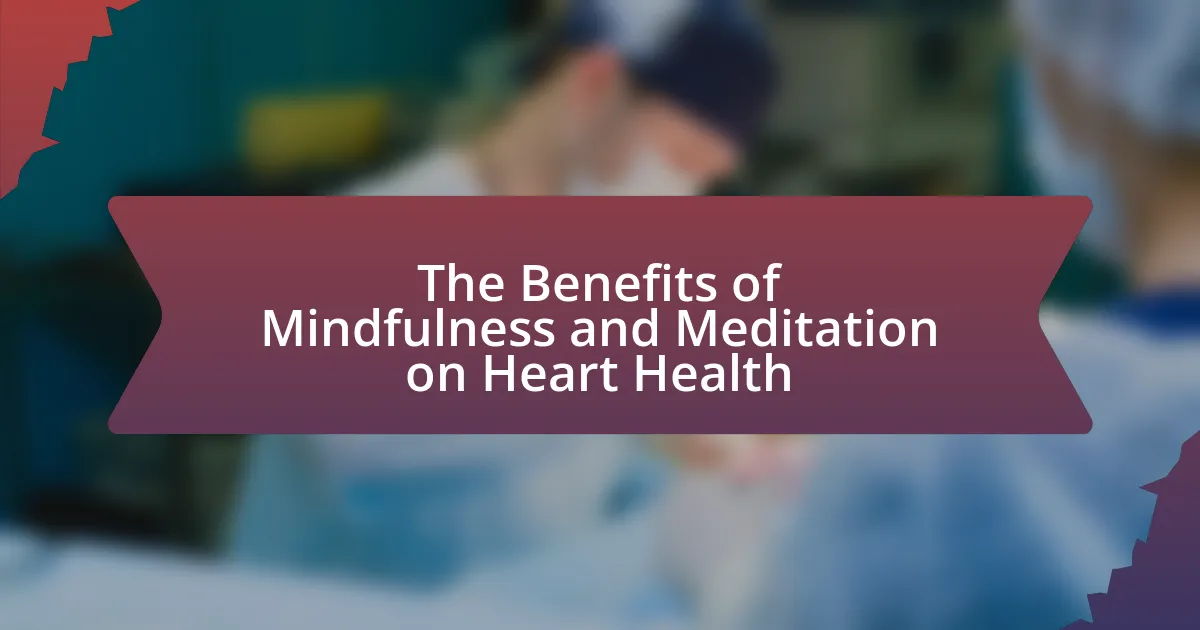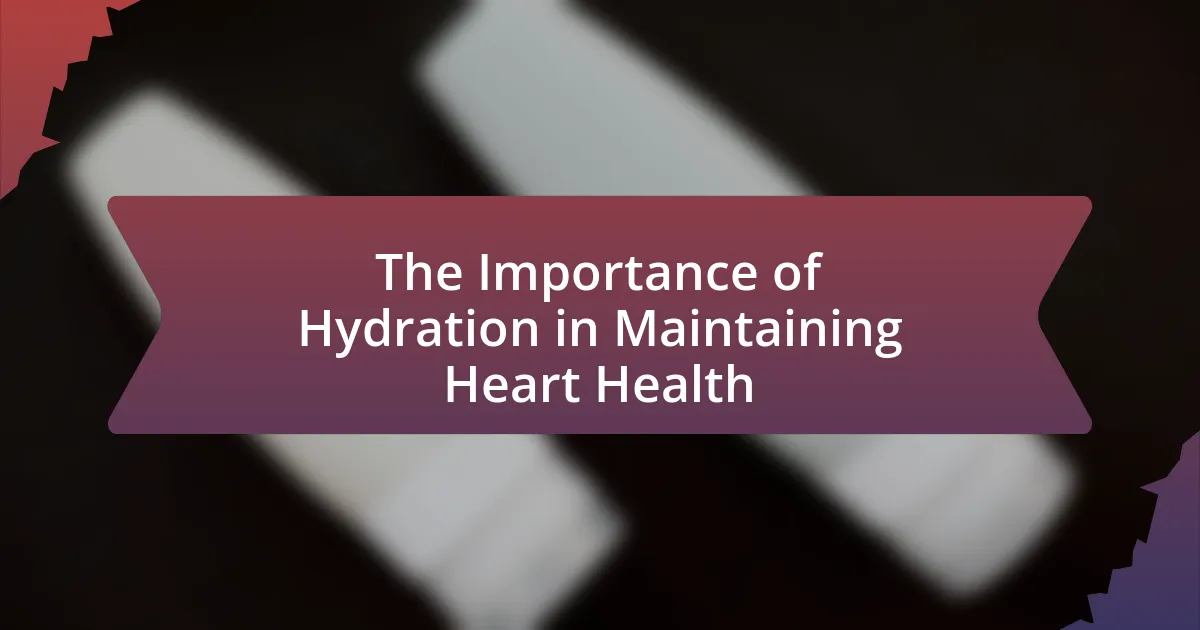Hypertension, defined as consistently elevated blood pressure levels of 130/80 mmHg or higher, is a significant medical condition affecting approximately 45% of adults in the United States. This article explores the various classifications of hypertension, including primary and secondary types, and emphasizes the importance of understanding its causes, such as genetics, lifestyle choices, and underlying health conditions. It also discusses the serious health risks associated with hypertension, including cardiovascular disease, stroke, and kidney damage, while outlining effective management strategies through lifestyle modifications and medical treatments. Understanding hypertension is crucial for implementing prevention and management strategies to reduce its impact on overall health and well-being.
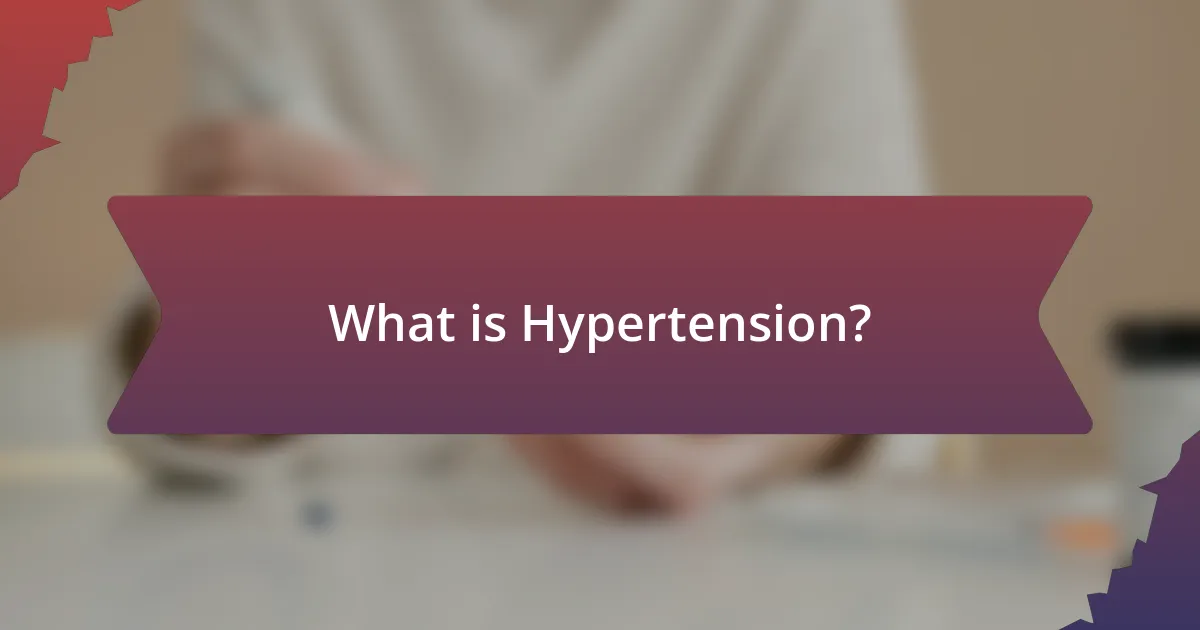
What is Hypertension?
Hypertension is a medical condition characterized by consistently elevated blood pressure levels in the arteries. Specifically, it is defined as having a blood pressure reading of 130/80 mmHg or higher, according to guidelines from the American College of Cardiology and the American Heart Association. This condition can lead to serious health complications, including heart disease, stroke, and kidney damage, as it forces the heart to work harder and can damage blood vessels over time.
How is Hypertension defined?
Hypertension is defined as a chronic medical condition characterized by consistently elevated blood pressure levels, specifically when systolic blood pressure is 130 mmHg or higher, or diastolic blood pressure is 80 mmHg or higher. This definition is established by the American College of Cardiology and the American Heart Association, which classify hypertension into different stages based on these measurements. The prevalence of hypertension affects approximately 45% of adults in the United States, highlighting its significance as a major risk factor for cardiovascular diseases.
What are the different classifications of Hypertension?
Hypertension is classified into two main categories: primary (essential) hypertension and secondary hypertension. Primary hypertension accounts for about 90-95% of cases and has no identifiable cause, often developing gradually over many years. Secondary hypertension, which constitutes about 5-10% of cases, is caused by an underlying condition such as kidney disease, hormonal disorders, or certain medications. This classification is supported by the American College of Cardiology and the American Heart Association, which emphasize the importance of identifying the type of hypertension for effective management and treatment.
How is Hypertension measured?
Hypertension is measured using a sphygmomanometer, which records blood pressure in millimeters of mercury (mmHg). Blood pressure readings consist of two numbers: systolic pressure, which measures the pressure in the arteries when the heart beats, and diastolic pressure, which measures the pressure in the arteries when the heart rests between beats. A typical reading is expressed as systolic over diastolic, for example, 120/80 mmHg. According to the American Heart Association, a reading of 130/80 mmHg or higher is classified as hypertension.
Why is understanding Hypertension important?
Understanding hypertension is important because it is a major risk factor for cardiovascular diseases, which are leading causes of death globally. Hypertension affects approximately 1.13 billion people worldwide, according to the World Health Organization, and can lead to serious health complications such as heart attack, stroke, and kidney failure if left unmanaged. Recognizing and understanding hypertension enables individuals and healthcare providers to implement effective prevention and management strategies, ultimately reducing the burden of these life-threatening conditions.
What are the potential health risks associated with Hypertension?
Hypertension can lead to several serious health risks, including heart disease, stroke, kidney damage, and vision loss. Specifically, high blood pressure increases the workload on the heart, which can result in heart failure or coronary artery disease. According to the American Heart Association, individuals with hypertension are at a significantly higher risk of experiencing a stroke, as elevated blood pressure can damage blood vessels in the brain. Additionally, chronic hypertension can impair kidney function, leading to chronic kidney disease or kidney failure. Furthermore, hypertension can cause damage to the retina, resulting in vision problems or blindness. These risks underscore the importance of managing blood pressure effectively to prevent severe health complications.
How does Hypertension impact overall health and well-being?
Hypertension negatively impacts overall health and well-being by increasing the risk of serious cardiovascular diseases, including heart attack and stroke. Elevated blood pressure can lead to damage in blood vessels, resulting in atherosclerosis, which is the buildup of plaque in arteries. According to the American Heart Association, nearly half of adults in the United States have hypertension, contributing to approximately 1 in 4 deaths from heart disease. Additionally, hypertension can cause kidney damage, vision loss, and cognitive decline, further diminishing quality of life. The World Health Organization states that managing hypertension through lifestyle changes and medication can significantly reduce these health risks.
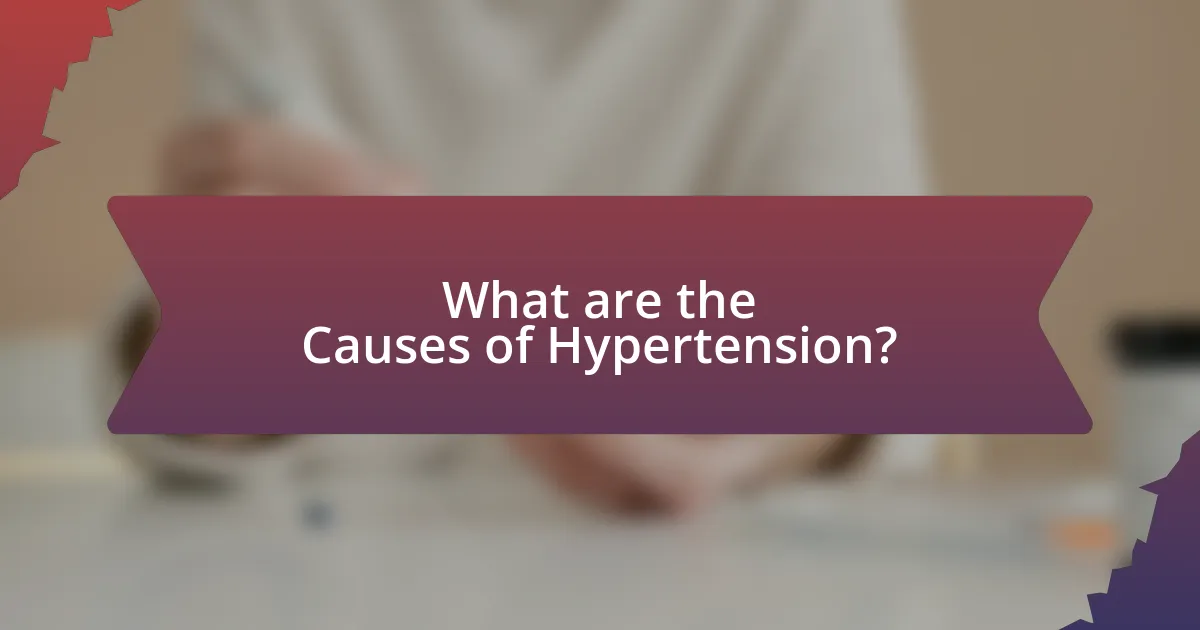
What are the Causes of Hypertension?
The primary causes of hypertension include genetic factors, poor diet, lack of physical activity, obesity, excessive alcohol consumption, and chronic stress. Genetic predisposition plays a significant role, as individuals with a family history of hypertension are more likely to develop the condition. Poor dietary habits, particularly high sodium intake, contribute to elevated blood pressure levels; studies indicate that reducing sodium can lower blood pressure in many individuals. Lack of physical activity is linked to weight gain and increased blood pressure, with the World Health Organization recommending at least 150 minutes of moderate exercise weekly to mitigate this risk. Obesity is a major risk factor, as excess body weight increases the strain on the heart and blood vessels. Excessive alcohol consumption can raise blood pressure, with guidelines suggesting moderation to prevent hypertension. Lastly, chronic stress can lead to temporary spikes in blood pressure and may contribute to long-term hypertension if not managed effectively.
What are the primary risk factors for developing Hypertension?
The primary risk factors for developing hypertension include obesity, high salt intake, physical inactivity, excessive alcohol consumption, and family history of hypertension. Obesity increases the workload on the heart and raises blood pressure, while high salt intake can lead to fluid retention and increased blood pressure. Physical inactivity contributes to weight gain and poor cardiovascular health. Excessive alcohol consumption can damage blood vessels and raise blood pressure. Additionally, a family history of hypertension indicates a genetic predisposition to the condition, as studies show that individuals with a family history are more likely to develop hypertension themselves.
How do lifestyle choices contribute to Hypertension?
Lifestyle choices significantly contribute to hypertension by influencing blood pressure levels through factors such as diet, physical activity, and stress management. For instance, a diet high in sodium and low in potassium can lead to increased blood pressure, as evidenced by research indicating that reducing sodium intake can lower blood pressure in hypertensive individuals. Additionally, a sedentary lifestyle is associated with higher blood pressure, with studies showing that regular physical activity can help maintain healthy blood pressure levels. Furthermore, chronic stress can elevate blood pressure through hormonal changes, highlighting the importance of stress management techniques. These lifestyle factors collectively demonstrate a clear link to the development and management of hypertension.
What role do genetics play in Hypertension?
Genetics play a significant role in hypertension, influencing an individual’s susceptibility to high blood pressure through inherited traits. Studies indicate that approximately 30-50% of hypertension cases can be attributed to genetic factors, with specific genes linked to blood pressure regulation, such as the angiotensinogen gene and the endothelial nitric oxide synthase gene. Research published in the journal “Nature Genetics” identified multiple genetic variants associated with hypertension, highlighting the complex interplay between genetic predisposition and environmental factors. This genetic influence underscores the importance of family history in assessing hypertension risk and developing personalized management strategies.
How do underlying health conditions affect Hypertension?
Underlying health conditions significantly influence hypertension by exacerbating blood pressure levels. Conditions such as diabetes, kidney disease, and obesity can lead to increased vascular resistance and fluid retention, both of which elevate blood pressure. For instance, diabetes can cause damage to blood vessels, making them less elastic and more prone to hypertension. Additionally, chronic kidney disease impairs the body’s ability to regulate sodium and fluid balance, further contributing to elevated blood pressure. Studies indicate that approximately 70% of individuals with diabetes also experience hypertension, highlighting the strong correlation between these conditions.
What chronic diseases are commonly associated with Hypertension?
Hypertension is commonly associated with several chronic diseases, including heart disease, stroke, chronic kidney disease, and diabetes. These conditions often share risk factors with hypertension, such as obesity, high cholesterol, and sedentary lifestyle. For instance, according to the American Heart Association, individuals with hypertension are at a significantly increased risk of developing heart disease, with studies indicating that nearly 70% of people with heart disease also have high blood pressure. Additionally, chronic kidney disease can result from prolonged hypertension, as high blood pressure can damage blood vessels in the kidneys, leading to impaired function.
How does age influence the risk of Hypertension?
Age significantly influences the risk of hypertension, with the likelihood of developing high blood pressure increasing as individuals grow older. Research indicates that the prevalence of hypertension rises from approximately 10% in individuals aged 20-34 to over 70% in those aged 65 and older. This increase is attributed to various factors, including arterial stiffness, changes in vascular structure, and the cumulative effects of lifestyle factors over time. Studies, such as those published in the Journal of the American College of Cardiology, demonstrate that age-related physiological changes contribute to the higher incidence of hypertension in older adults.
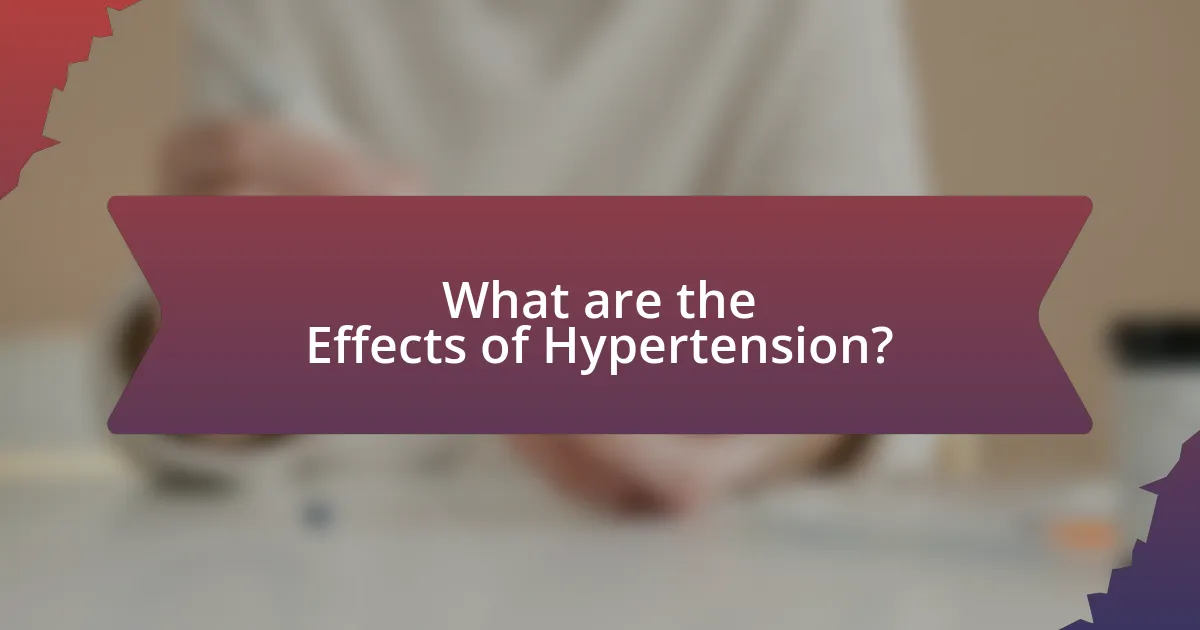
What are the Effects of Hypertension?
Hypertension primarily leads to serious health complications, including cardiovascular disease, stroke, kidney damage, and vision loss. Elevated blood pressure causes the heart to work harder, which can result in heart failure and coronary artery disease. According to the American Heart Association, hypertension is a major risk factor for stroke, contributing to nearly 50% of all strokes. Additionally, chronic high blood pressure can damage blood vessels in the kidneys, leading to chronic kidney disease. Furthermore, hypertension can cause damage to the retina, resulting in vision impairment or loss. These effects underscore the critical importance of managing blood pressure to prevent severe health outcomes.
How does Hypertension affect the cardiovascular system?
Hypertension negatively impacts the cardiovascular system by increasing the workload on the heart and damaging blood vessels. Elevated blood pressure forces the heart to pump harder, which can lead to hypertrophy of the heart muscle, increasing the risk of heart failure. Additionally, high blood pressure causes damage to the endothelial lining of blood vessels, promoting atherosclerosis, which narrows arteries and restricts blood flow. According to the American Heart Association, hypertension is a major risk factor for cardiovascular diseases, contributing to approximately 50% of all cases of heart disease and stroke.
What are the long-term consequences of untreated Hypertension?
Untreated hypertension can lead to severe long-term consequences, including cardiovascular disease, kidney damage, and stroke. Specifically, high blood pressure can cause the heart to work harder, leading to conditions such as heart failure and coronary artery disease. According to the American Heart Association, untreated hypertension is a major risk factor for stroke, as it can damage blood vessels in the brain. Additionally, chronic high blood pressure can result in nephropathy, which is kidney damage that may progress to kidney failure. These consequences highlight the critical importance of managing hypertension to prevent serious health complications.
How can Hypertension lead to other serious health issues?
Hypertension can lead to other serious health issues by causing damage to blood vessels and organs over time. Elevated blood pressure increases the workload on the heart, which can result in heart disease, heart failure, and stroke. Additionally, hypertension can lead to kidney damage, as the increased pressure can impair the kidneys’ ability to filter waste effectively. According to the American Heart Association, nearly 50% of adults with hypertension develop cardiovascular disease, highlighting the direct correlation between high blood pressure and severe health complications.
What are the psychological effects of living with Hypertension?
Living with hypertension can lead to significant psychological effects, including increased anxiety, depression, and stress. Research indicates that individuals with hypertension often experience heightened levels of anxiety due to concerns about health complications, such as heart disease or stroke. A study published in the Journal of Hypertension found that approximately 30% of hypertensive patients reported symptoms of anxiety, while another study in the American Journal of Cardiology highlighted a correlation between hypertension and depressive symptoms, affecting around 20% of patients. These psychological effects can further complicate the management of hypertension, as stress and anxiety may contribute to poor adherence to treatment regimens and lifestyle modifications.
How does Hypertension impact mental health?
Hypertension negatively impacts mental health by increasing the risk of anxiety, depression, and cognitive decline. Studies indicate that individuals with hypertension are more likely to experience mood disorders due to the stress and physiological changes associated with high blood pressure. For instance, research published in the Journal of Hypertension found that hypertensive patients exhibited higher levels of anxiety and depressive symptoms compared to those with normal blood pressure. Additionally, hypertension can lead to vascular changes in the brain, contributing to cognitive impairment and increasing the risk of dementia.
What coping strategies can help manage the psychological effects?
Coping strategies that can help manage the psychological effects of hypertension include mindfulness meditation, cognitive-behavioral therapy (CBT), and regular physical activity. Mindfulness meditation has been shown to reduce stress and anxiety, which are common psychological effects associated with hypertension. A study published in the Journal of Hypertension found that participants who practiced mindfulness experienced significant reductions in blood pressure and anxiety levels. Cognitive-behavioral therapy helps individuals identify and change negative thought patterns, leading to improved emotional regulation and coping skills. Research in the American Journal of Psychiatry indicates that CBT can effectively reduce anxiety and depression in patients with chronic health conditions, including hypertension. Regular physical activity not only improves physical health but also releases endorphins, which enhance mood and reduce stress. The American Heart Association recommends at least 150 minutes of moderate-intensity exercise per week to support both physical and mental well-being.
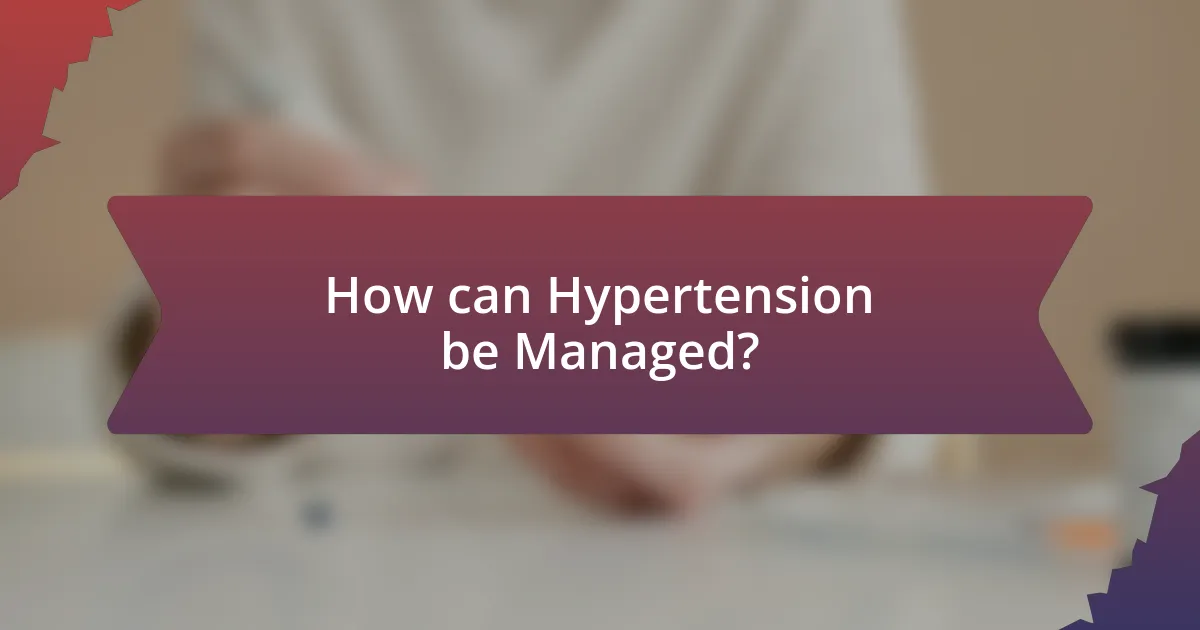
How can Hypertension be Managed?
Hypertension can be managed through lifestyle modifications, medication, and regular monitoring. Lifestyle changes include adopting a balanced diet low in sodium, engaging in regular physical activity, maintaining a healthy weight, and reducing alcohol consumption. Medications such as diuretics, ACE inhibitors, and beta-blockers may be prescribed to help control blood pressure levels. Regular monitoring of blood pressure is essential to assess the effectiveness of the management plan and make necessary adjustments. According to the American Heart Association, effective management can significantly reduce the risk of cardiovascular diseases associated with hypertension.
What lifestyle changes can help control Hypertension?
To control hypertension, individuals should adopt several lifestyle changes, including maintaining a healthy diet, engaging in regular physical activity, managing stress, limiting alcohol intake, and avoiding tobacco use. A diet rich in fruits, vegetables, whole grains, and low-fat dairy products, known as the DASH (Dietary Approaches to Stop Hypertension) diet, has been shown to lower blood pressure significantly. Regular physical activity, such as 150 minutes of moderate exercise per week, can also help reduce hypertension by improving heart health and circulation. Stress management techniques, including mindfulness and relaxation exercises, contribute to lower blood pressure levels. Additionally, limiting alcohol consumption to moderate levels—up to one drink per day for women and two for men—can further aid in controlling hypertension. Finally, avoiding tobacco use is crucial, as smoking increases blood pressure and damages blood vessels. These lifestyle modifications are supported by various studies, including those published by the American Heart Association, which emphasize their effectiveness in managing hypertension.
How does diet influence blood pressure levels?
Diet significantly influences blood pressure levels by affecting the body’s sodium balance, vascular health, and overall weight. High sodium intake is directly linked to increased blood pressure, as it causes the body to retain water, leading to higher blood volume and pressure on blood vessel walls. Conversely, diets rich in potassium, such as fruits and vegetables, can help lower blood pressure by promoting sodium excretion and relaxing blood vessel walls. The DASH (Dietary Approaches to Stop Hypertension) diet, which emphasizes whole grains, lean proteins, and low-fat dairy, has been shown to reduce blood pressure in clinical studies, demonstrating that dietary choices play a crucial role in managing hypertension.
What role does physical activity play in managing Hypertension?
Physical activity plays a crucial role in managing hypertension by lowering blood pressure and improving overall cardiovascular health. Regular exercise, such as aerobic activities, has been shown to reduce systolic blood pressure by an average of 4 to 9 mmHg in individuals with hypertension. This effect is attributed to enhanced endothelial function, increased nitric oxide availability, and improved vascular compliance. Additionally, the American Heart Association recommends at least 150 minutes of moderate-intensity aerobic exercise per week to effectively manage blood pressure levels.
What medical treatments are available for Hypertension?
The medical treatments available for hypertension include lifestyle modifications and pharmacological interventions. Lifestyle modifications consist of dietary changes, increased physical activity, and weight management, which can significantly lower blood pressure. Pharmacological interventions involve various classes of medications such as diuretics, ACE inhibitors, angiotensin II receptor blockers (ARBs), calcium channel blockers, and beta-blockers, each targeting different mechanisms to reduce blood pressure. For instance, a study published in the Journal of the American College of Cardiology indicates that these medications can effectively lower systolic blood pressure by an average of 10-20 mmHg, depending on the class and individual patient response.
What types of medications are commonly prescribed for Hypertension?
Commonly prescribed medications for hypertension include diuretics, ACE inhibitors, angiotensin II receptor blockers (ARBs), calcium channel blockers, and beta-blockers. Diuretics, such as hydrochlorothiazide, help reduce blood volume by promoting urine production. ACE inhibitors, like lisinopril, work by relaxing blood vessels. ARBs, such as losartan, block the action of a hormone that narrows blood vessels. Calcium channel blockers, including amlodipine, prevent calcium from entering heart and blood vessel cells, leading to relaxation. Beta-blockers, like metoprolol, decrease heart rate and the force of contraction. These medications are supported by clinical guidelines from organizations such as the American College of Cardiology and the American Heart Association, which recommend their use based on extensive research demonstrating their efficacy in managing hypertension.
How do healthcare providers monitor and adjust treatment plans?
Healthcare providers monitor and adjust treatment plans through regular patient assessments, data analysis, and feedback mechanisms. They utilize clinical guidelines and evidence-based practices to evaluate the effectiveness of treatments, often incorporating patient-reported outcomes and vital sign measurements. For instance, in managing hypertension, providers may track blood pressure readings over time and adjust medications based on these results, ensuring that the treatment aligns with the patient’s response and any side effects experienced. This approach is supported by studies indicating that continuous monitoring leads to better management of chronic conditions, as evidenced by improved patient outcomes in hypertension management when treatment plans are regularly reviewed and modified based on real-time data.
What are some practical tips for managing Hypertension effectively?
To manage hypertension effectively, individuals should adopt a combination of lifestyle changes and medical interventions. Regular physical activity, such as 150 minutes of moderate exercise per week, can lower blood pressure significantly. A balanced diet rich in fruits, vegetables, whole grains, and low-fat dairy, known as the DASH diet, has been shown to reduce hypertension by up to 11 mmHg. Limiting sodium intake to less than 2,300 mg per day, or ideally 1,500 mg, is also crucial, as high sodium levels are directly linked to increased blood pressure. Additionally, maintaining a healthy weight and managing stress through techniques like mindfulness or yoga can further contribute to blood pressure control. Regular monitoring of blood pressure at home and adherence to prescribed medications are essential for effective management. These strategies are supported by research from the American Heart Association, which emphasizes the importance of lifestyle modifications in controlling hypertension.



